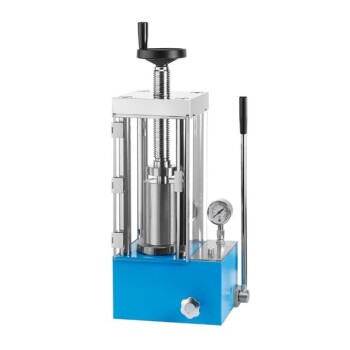The primary advantages of a benchtop press are its compact, space-saving design, its operational versatility, and its inherent precision. These presses are engineered to deliver controlled force in applications where a large industrial machine is unnecessary or impractical, making them ideal for workshops, laboratories, and small-scale production environments.
A benchtop press is the optimal choice when precision and versatility are required within a limited workspace. While larger presses deliver more force, the benchtop model excels by providing controlled, repeatable results without demanding significant floor space or extensive operator training.

The Core Benefits of a Benchtop Design
Benchtop presses are defined by their ability to provide significant utility from a small form factor. This makes them a strategic asset in a variety of professional settings.
Maximizing Workspace with a Compact Footprint
The most immediate advantage is the space-saving design. Unlike large, floor-standing presses that require dedicated facility space, a benchtop model can be placed on any sturdy workbench.
This frees up valuable floor area for other equipment or operations, making it an essential piece of machinery for smaller workshops or R&D labs where space is at a premium.
Versatility in Application
Benchtop presses are not a one-trick pony. They can be configured in various ways, such as with hydraulic or screw-driven mechanisms, to suit different tasks.
This adaptability allows them to be used for a wide range of applications, including component assembly, staking, forming, punching, and testing a variety of materials with consistent results.
Engineered for Precision and Control
These presses are designed to apply force or movement in precise, repeatable increments. This engineering focus on precision is critical for applications that demand high quality and consistency.
Whether pressing a bearing into a housing or forming a delicate electronic component, the control offered by a benchtop press ensures the task is completed to exact specifications every time.
Ease of Use and Accessibility
Most benchtop presses are designed for straightforward operation, requiring minimal user training. Their simple mechanics and controls make them highly accessible to operators of all skill levels.
This lowers the barrier to implementation and allows teams to become productive quickly without investing in extensive and specialized training programs.
Understanding the Trade-offs and Limitations
To make an informed decision, you must also understand what a benchtop press is not designed to do. Its advantages in one area create necessary limitations in another.
Force and Capacity Constraints
The most significant trade-off is power. By design, benchtop presses have lower pressure and tonnage capacities compared to their larger, floor-standing counterparts.
They are not suitable for heavy-duty industrial tasks like deep drawing of large steel parts or high-tonnage forging operations.
Throughput for Mass Production
While excellent for single-piece or small-batch work, a manual or semi-automated benchtop press may not offer the speed required for high-volume mass production.
Fully automated, dedicated industrial systems are better suited for assembly lines where cycle time and throughput are the primary metrics of success.
Making the Right Choice for Your Goal
Your specific application determines whether a benchtop press is the right tool for the job.
- If your primary focus is research, development, or small-batch assembly: A benchtop press offers the ideal balance of precision, versatility, and a small footprint.
- If your primary focus is maximizing limited workshop space: The compact design of a benchtop model is its single greatest advantage over larger floor presses.
- If your primary focus is high-tonnage forming or large-scale production: You should evaluate floor-standing hydraulic presses designed for higher force and industrial throughput.
Ultimately, selecting a benchtop press is a strategic decision to prioritize precision and adaptability within a constrained physical environment.
Summary Table:
| Advantage | Description |
|---|---|
| Compact Footprint | Saves space by fitting on a workbench, ideal for small workshops or labs. |
| Versatility | Adaptable for tasks like assembly, forming, and testing with various mechanisms. |
| Precision | Delivers controlled, repeatable force for high-quality, consistent results. |
| Ease of Use | Simple operation with minimal training required for quick productivity. |
Ready to enhance your lab's efficiency with a benchtop press? KINTEK specializes in lab press machines, including automatic lab presses, isostatic presses, and heated lab presses, designed to deliver precision, versatility, and space-saving benefits for laboratories and small-scale production. Contact us today to discuss how our solutions can meet your specific needs and boost your productivity!
Visual Guide

Related Products
- Automatic Laboratory Hydraulic Press for XRF and KBR Pellet Pressing
- Manual Laboratory Hydraulic Press Lab Pellet Press
- Automatic Laboratory Hydraulic Press Lab Pellet Press Machine
- Automatic Heated Hydraulic Press Machine with Hot Plates for Laboratory
- Manual Heated Hydraulic Lab Press with Integrated Hot Plates Hydraulic Press Machine
People Also Ask
- How are hydraulic presses used in spectroscopy and compositional determination? Enhance Accuracy in FTIR and XRF Analysis
- What safety features are associated with hydraulic presses in laboratories? Ensure Operator and Equipment Protection
- What is the function of a laboratory press machine in forming a green pellet from Li₆.₅La₃Zr₁.₅Ta₀.₅O₁₂ (LLZTO) electrolyte powder? Achieve High-Density Solid Electrolytes for Superior Battery Performance
- How do hydraulic press machines ensure precision and consistency in pressure application? Achieve Reliable Force Control for Your Lab
- How does a hydraulic press aid in XRF spectroscopy? Achieve Accurate Elemental Analysis with Reliable Sample Prep



















